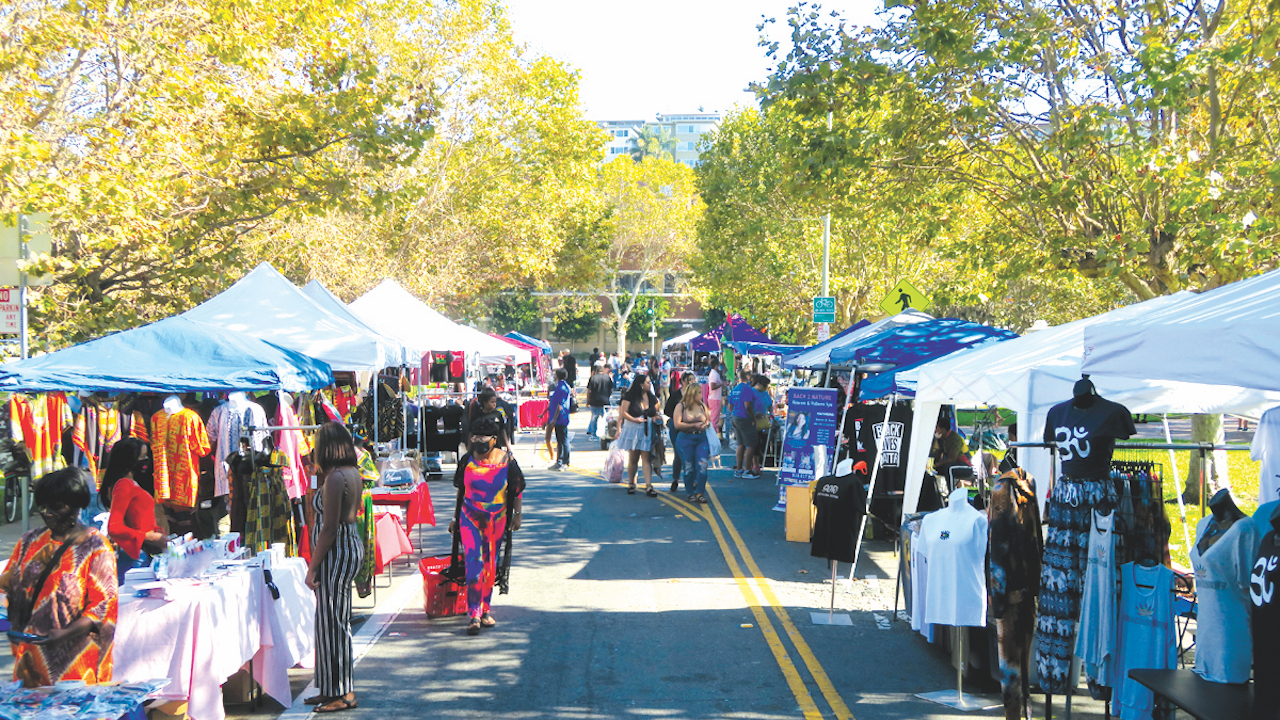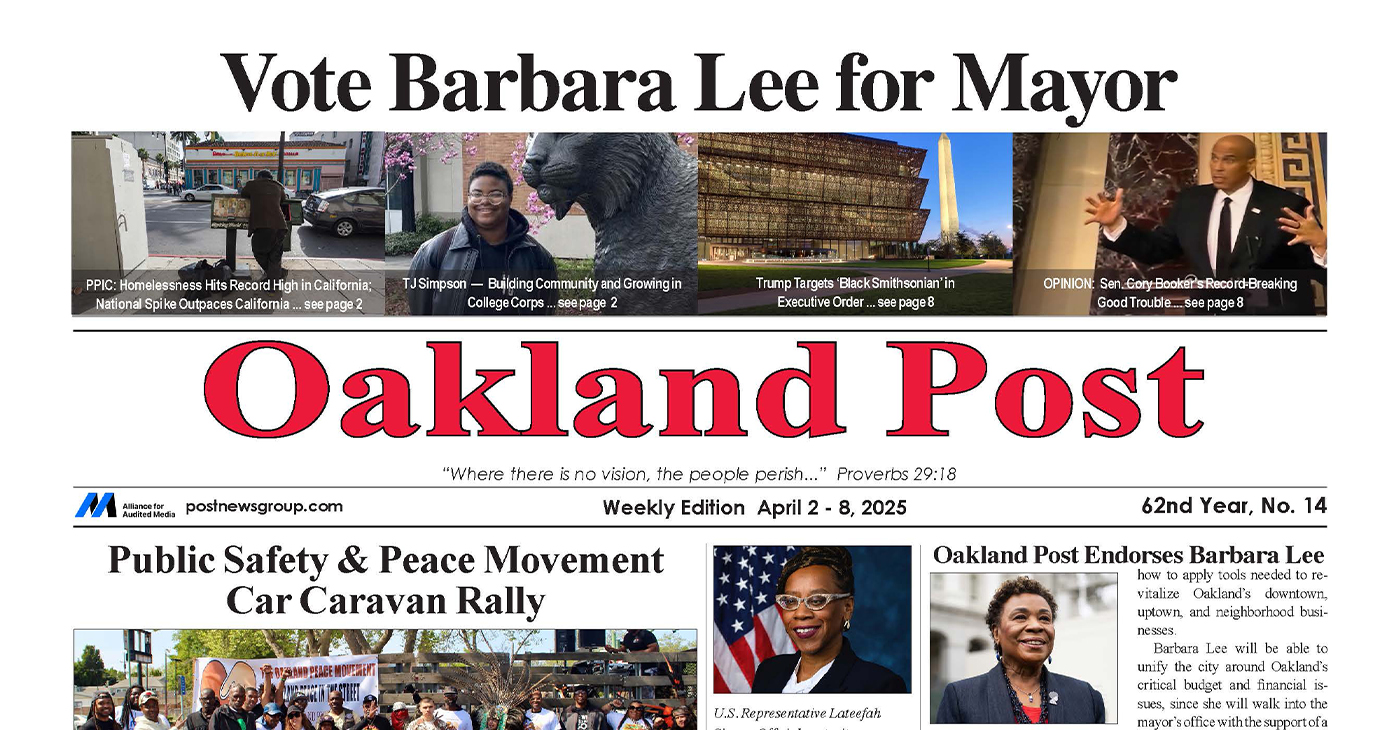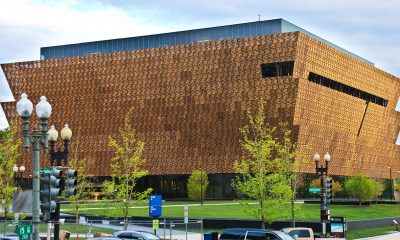Community
Black Solidarity Week at Lake Merritt in Oakland

Malcolm X and Black Panther Party Co-Founder Dr. Huey P. Newton would be proud.
Oakland’s fourth annual Black Solidarity Week (BSW), which begins on Newton’s birthday, February 17, and ends on February 21, the anniversary of the assassination of Malcolm X, honors principles of liberation for Black people that both men espoused.
Sponsored by the Community Ready Corps (CRC) and the Black Solidarity Group and supported by James Copes of Old School Copes, BSW marks a time to observe what organizers call the nine Components of Self Determination. Those components include: Self Defense & Safety; Family System & Stability; Traditions & Ways; Technology & Efficacy; Education & Competence; Art & Media; Politics & Governance; and Health & Well Being.
On Saturday, there’s an opportunity to engage in the ninth component, “Economics & Prosperity,” in one of the premier activities for BSW — a vendor marketing event held on Saturday, February 20, from 10:00 AM to 5:00 PM at the El Embarcadero, between the Lakeside Library and the Pergola and Colonnade at the northeastern end of Lake Merritt.
“The power of Black solidarity is the impetus of strengthening the Black community to help it thrive and be successful, especially in the areas of economics and prosperity,” said Tur-Ha Ak, founder, and leader of the CRC.
This Black Solidary Market is an opportunity for Black vendors to showcase and sell their products to the public, which is one of the nine areas of self-determination and self-sufficiency that make up the CRC’s primary objectives since its concept in 2017, said Ak.
“Our prime objective is to build and/or contribute to self-determination in disenfranchised communities,” Ak continued. “We believe that, in order to be truly self-determined, community needs to be able to express power where power is being expressed. With this in mind, we work towards the empowerment of oppressed people and communities in what we call the nine Components of Self Determination.”
Operating under the theme of “Contribution and Commitment,” the Black Solidarity Group has partnered with James Copes of “Old School Copes” who spearheaded and has been the spokesperson for past vendor marketing activities that have taken place on the eastern shore of Lake Merritt last summer.
That original market has since shuttered, and as a result of a pilot program that began last fall near the El Embarcadero, this new Black Solidarity Market event was born.
Copes said he expects approximately 30 vendors and artisans to be selling an array of products at Saturday’s event, some of whom have already signed up. “This is the first event at the lake organized this year and we hope to accommodate up to 40 vendors if necessary. We anticipate serving a large population of attendees as we’ve not had the opportunity to experience an event such as this for some time,” Copes said.
Pop-up vendors will have available Oakland products, art, clothing, candles, jewelry, Black books, and T-shirts, among the many unique items that attendees can purchase. Additionally, there will be food vendors offering an array of meals for everyone’s appetite and desire. There will also be live music and fresh market produce will be given away to attendees, Copes said.
“CRC’s involvement with the BSW is a concept that we created, which was launched in 2017,” said AK. “This is part of our Black solidarity agenda and we feel it is vitally important to build self-sufficiency in all nine areas. This was already happening with what Copes was doing in the past, so we didn’t have to reinvent the wheel.
“We are providing resources and basically magnifying an event that has already been established. Together, we’re fulfilling the goal of creating economics and prosperity in our community,” Ak said.
“Our goal is to collaborate and partner with the City to keep this market going,” said Copes. “We’re looking forward to the support of City Councilmembers Carroll Fife and Nikki(Fortunato) Bas whose districts border the lake. We will continue to move forward and find resources to support vendors to build a strong economic base.”
“This first pop-up event of the year is encouraging,” Copes added. “The pandemic continues and has gotten worse, particularly for Black folks, who have been struggling to stay afloat. It is people of color who have been affected most by the pandemic because we are the ones who do the service jobs and are more susceptible to becoming infected by the virus.”
Event Coordinator Denmark Peoples said precautions are in place for this weekend event. “We will be following and adhering to all CDC guidelines for the protection and safety of all attendees,” said Peoples. “Temperatures will be checked at vendor stations and everyone will be required to wear masks as they stroll throughout the market.”
“This Fourth Annual Black Solidarity Week is an opportunity for the community to support Black vendors. This ties in the overall theme and Black agenda of CRC’s primary objectives,” Peoples said.
For vendors interested in participating in the pop-up, email at oldschoolcopes@gmail.com or call 510–205–7507 to sign up.
#NNPA BlackPress
Lawmakers Greenlight Reparations Study for Descendants of Enslaved Marylanders
BLACKPRESSUSA NEWSWIRE — Maryland lawmakers have approved Senate Bill 587, authorizing the creation of the Maryland Reparations Commission.

By Stacy M. Brown
BlackPressUSA.com Senior National Correspondent
Maryland lawmakers have approved Senate Bill 587, authorizing the creation of the Maryland Reparations Commission. The body will study and make recommendations for reparations to descendants of enslaved people and others harmed by centuries of discriminatory policies. The legislation now awaits the governor’s signature and is scheduled to take effect July 1, 2025. The commission will examine Maryland’s long history of slavery, the economic and social systems that benefited from it, and the lingering impacts of those institutions. Its work will include recommendations on financial compensation, housing and business support, tuition waivers, and other forms of restitution. “This commission is not only about acknowledging our past – it’s about using that understanding to pave the way for a more equitable and fair future,” said Del. Jheanelle Wilkins, Chair of the Legislative Black Caucus of Maryland, which made reparations a top priority for the first time this legislative session.
From its founding in 1634 until the abolition of slavery in 1864, Maryland was a society built on slave labor. Tobacco, the colony’s staple crop, fueled economic growth and political dominance for the state’s elite. By the mid-18th century, nearly one-third of Maryland’s population was enslaved. Skilled and unskilled laborers like Frederick Douglass, who caulked ships in Baltimore, contributed to the state’s prosperity under brutal conditions. The legacy of that bondage continued to echo across generations. Del. Aletheia McCaskill, the lead sponsor of the House version of the bill, said the measure lays the groundwork for redress. “I am overjoyed at the passage of this monumental legislation,” McCaskill said. “This commission will gather historical evidence, examine present-day disparities, and provide a data-driven framework to acknowledge past harms. By recommending policies and developing solutions to repair the damage done, we can take meaningful steps toward true equity in our state.”
Sen. C. Anthony Muse, sponsor of the Senate version, called the passage historic. “We took a historic step towards justice and healing for our communities,” Muse remarked. “The passage of Maryland Senate Bill 587 marks a significant commitment to addressing the long-lasting effects of slavery and systemic inequities.” The commission’s membership will include lawmakers, historians, HBCU scholars, civil rights experts, representatives from the NAACP and the Maryland Black Chamber of Commerce, and members of the public. It will examine reparations programs in other states and recommend procedures for verifying eligibility and the feasibility of funding and distributing reparations. Maryland’s history makes it a powerful setting for this initiative. The state witnessed the forced transport of nearly 100,000 Africans during the 18th century. The rise of tobacco plantations led to a devastating regime marked by family separation, disease, forced labor, and systemic brutality. Enslaved individuals in Maryland built canals, smelted iron, and helped fuel the economic engine of the state while living under constant threat of sale or violence. The stories of individuals like Hillery Kane at Sotterley Plantation and Lucy Jackson at Hampton Mansion reveal not only the cruelty of slavery but also the resilience and resistance of the enslaved.
By the 19th century, Maryland became a central player in the domestic slave trade, with an estimated 20,000 people sold to cotton plantations in the Deep South between 1830 and 1860. Even after emancipation in 1864, freed Black Marylanders faced decades of disenfranchisement, segregation, and economic exclusion. “This is about more than history,” Wilkins said. “It’s about how that history has shaped the realities of today.” The commission will submit a preliminary report by January 1, 2027, and a final report by November 1, 2027. It will explore possible sources of funding, such as businesses and institutions that benefited from slavery and discriminatory government practices.
Opposition to the bill has centered mainly on its cost, but the fiscal note details only a modest increase of $54,500 in 2026 to fund contractual staff. No reparations payments are authorized under the current bill. Maryland is joining California, Colorado, Illinois, Massachusetts, and New York in forming a reparations commission. The move comes as diversity, equity, and inclusion initiatives face increasing national scrutiny and political attacks. Still, supporters of the commission insist the time for reckoning is now. “We’re not just commemorating the past,” McCaskill said. “We are charting a course toward justice, informed by our truth and grounded in our responsibility to future generations.”
#NNPA BlackPress
Harris, Obama, and Booker Step Up as Resistance Against Trump Takes Shape
BLACKPRESSUSA NEWSWIRE — Obama, meanwhile, broke his silence during an appearance at Hamilton College in New York, offering one of his sharpest public critiques yet of Trump’s second administration.

By Stacy M. Brown
BlackPressUSA.com Senior National Correspondent
Is the resistance finally taking form?
As Kendrick Lamar asked during his powerful Super Bowl performance, “Are we really about to do it?” That question now echoes in the political arena as former President Barack Obama and former Vice President Kamala Harris have entered the public fray, joining voices like New Jersey Sen. Cory Booker and Texas Rep. Jasmine Crockett in confronting President Donald Trump and his administration’s sweeping changes head-on. After months of relative silence following her defeat to Trump last November, Harris returned to the spotlight Thursday during a rare appearance at the Leading Women Defined conference at a seaside resort in Dana Point, California. According to The Los Angeles Times, she didn’t mention Trump by name but spoke forcefully about the anxiety many Americans are experiencing under his new administration.
“There is a sense of fear that is taking hold in our country, and I understand it,” Harris said. “These are the things that we are witnessing each day in these last few months in our country, and it understandably creates a great sense of fear. Because, you know, there were many things that we knew would happen, many things.” “I’m not here to say, ‘I told you so,’” she continued. “I swore I wasn’t going to say that.” The appearance marked a shift in tone for Harris, who has been weighing a potential run for governor of California in 2026 or waiting until 2028 for another shot at the presidency. Still, she clarified that her political silence hasn’t equated to surrender. “We can’t go out there and do battle if we don’t take care of ourselves and each other,” Harris told the crowd. “I’ll see you out there. I’m not going anywhere.”
Obama, meanwhile, broke his silence during an appearance at Hamilton College in New York, offering one of his sharpest public critiques yet of Trump’s second administration. He condemned Trump’s attempts to reshape the federal government, stifle dissent, and punish those who oppose his policies. “So, this is the first time I’ve been speaking publicly for a while,” Obama said. “I’ve been watching for a little bit.” “Imagine if I had done any of this,” Obama added. “It’s unimaginable that the same parties that are silent now would have tolerated behavior like that from me or a whole bunch of my predecessors.” While calling Trump’s proposed tariffs bad for America, Obama said his larger concern lies with what he described as the White House’s alarming overreach.
“I’m more deeply concerned with a federal government that threatens universities if they don’t give up students who are exercising their right to free speech,” he said. “The idea that a White House can say to law firms, if you represent parties that we don’t like, we’re going to pull all our business or bar you from representing people effectively. That kind of behavior is contrary to the basic compact we have as Americans.” Obama, who campaigned for Harris during the final stretch of the 2024 election, had warned that a second Trump term would endanger the nation’s democratic norms. “Just because [Trump] acts goofy,” Obama said at the time, “doesn’t mean his presidency wouldn’t be dangerous.” With Trump’s second term underway, the voices of resistance are growing louder.
Sen. Cory Booker added fuel to the movement by making history on the Senate floor. He delivered a 25-hour, 5-minute filibuster that broke the record previously held by segregationist Sen. Strom Thurmond. Thurmond’s 1957 filibuster—lasting 24 hours and 18 minutes—was aimed at blocking the Civil Rights Act. Booker used his record-breaking speech to denounce what he called a deliberate dismantling of government at the hands of Trump, Elon Musk, and Congressional Republicans. “It always seemed wrong,” Booker said, referring to the Senate room still named after Thurmond. “It seemed wrong to me when I got here in 2013. It still seems wrong today.”
The New Jersey senator, a descendant of both enslaved people and slave owners, framed his marathon speech as a moral plea, reading letters from Americans affected by deep cuts and policy threats to Medicare, Medicaid, Social Security, and SNAP. “This is a moral moment,” Booker declared. “It’s not left or right; it’s right or wrong.” With Booker’s record-setting stand, Harris’s reemergence, and Obama’s warning shots, what once felt like fragmented frustration among Democrats may now be coalescing into something more deliberate: a resistance that is finally, visibly, on the move. “I’ll see you out there,” Harris said. “I’m not going anywhere.”
Activism
Oakland Post: Week of April 2 – 8, 2025
The printed Weekly Edition of the Oakland Post: Week of April 2 – 8, 2025

To enlarge your view of this issue, use the slider, magnifying glass icon or full page icon in the lower right corner of the browser window.
-

 Activism2 weeks ago
Activism2 weeks agoWe Fought on Opposite Sides of the Sheng Thao Recall. Here’s Why We’re Uniting Behind Barbara Lee for Oakland Mayor
-

 Activism4 weeks ago
Activism4 weeks agoOakland Post: Week of March 5 – 11, 2025
-

 #NNPA BlackPress2 weeks ago
#NNPA BlackPress2 weeks agoRev. Dr. Jamal Bryant’s Black Church Target Boycott Mobilizes 150,000
-

 Activism3 weeks ago
Activism3 weeks agoSan Francisco Is Investing Millions to Address Food Insecurity. Is Oakland Doing the Same?
-

 #NNPA BlackPress2 weeks ago
#NNPA BlackPress2 weeks agoRecently Approved Budget Plan Favors Wealthy, Slashes Aid to Low-Income Americans
-

 #NNPA BlackPress4 weeks ago
#NNPA BlackPress4 weeks agoFighting to Keep Blackness
-

 Activism2 weeks ago
Activism2 weeks agoFaith Leaders Back Barbara Lee for Mayor, Criticize Candidate Loren Taylor for Dishonest Campaigning
-

 Activism3 weeks ago
Activism3 weeks agoOakland Post: Week of March 12 – 18, 2025





















































